-
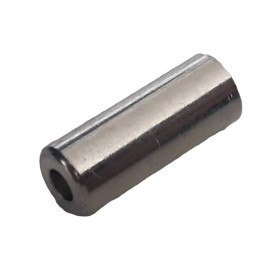 New product -25%Outer casing cap for derailleur
New product -25%Outer casing cap for derailleur- €0.18
- €0.24
-
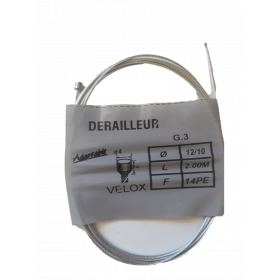 New productVelox derailleur cable
New productVelox derailleur cable- €1.49
-
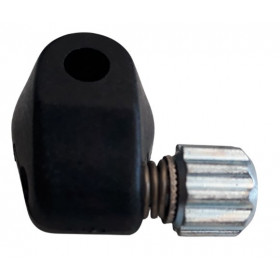 New productSheath stop on frame
New productSheath stop on frame- €3.99
-
 New product -51%Derailleurs cables and outer casing for road bike Optislick Shimano
New product -51%Derailleurs cables and outer casing for road bike Optislick Shimano- €14.70
- €29.99
-
 New product -51%Derailleurs cables and outer casing for road bike Shimano
New product -51%Derailleurs cables and outer casing for road bike Shimano- €12.25
- €24.99
-
 New product -45%Derailleurs cables and outer casing for road bike Dura ace Shimano
New product -45%Derailleurs cables and outer casing for road bike Dura ace Shimano- €28.87
- €52.49
-
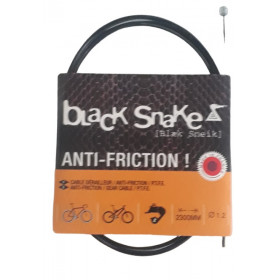 New product -50%Anti-friction derailleur cable Black Snake 2.3 m
New product -50%Anti-friction derailleur cable Black Snake 2.3 m- €3.50
- €7.00
-
 New product -48%Brakes cables and outer casing for road bike PTFE Shimano
New product -48%Brakes cables and outer casing for road bike PTFE Shimano- €22.87
- €43.99
-
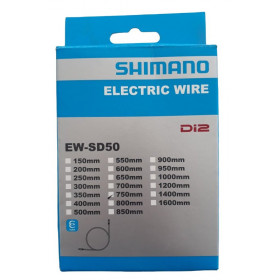 More detailsNew product -30% Out-of-StockShimano electric cable Di2 EW-SD50
More detailsNew product -30% Out-of-StockShimano electric cable Di2 EW-SD50- €25.19
- €35.99
Showing 1-9 of 9 item(s)
Everything you need to know about a road bike derailleur cable: features, specifics, and expert tips
In the world of road bike transmission systems, the road bike derailleur cable plays a crucial—yet often overlooked—role. This small component is essential to the proper function of both the front and rear derailleur, connecting the road bike shifter to the derailleur to enable smooth and accurate gear changes. But how do you choose the right derailleur cable? What are the key features? Let’s take a closer look at this vital part of your bike’s drivetrain.
What is a road bike derailleur cable for ?
The derailleur cable is a steel wire—usually stainless or galvanized—that transfers shifting commands from the shifters to the road bike derailleur. When pulled or released, it adjusts the derailleur's position to move the chain across the cassette or chainrings.
In short, without a high-quality, properly functioning derailleur cable, you can't expect smooth gear shifting on your road bike.
Key features of a road bike derailleur cable
Here are the main specifications to look out for:
Diameter and Length
-
Standard diameter: 1.1 mm or 1.2 mm
-
Length: usually between 1.8 m and 2.3 m depending on brand and front or rear application
Material
-
Stainless steel: corrosion-resistant, long-lasting, and smoother operation
-
Galvanized steel: more budget-friendly but less resistant to moisture
-
Premium cables may have PTFE (Teflon) or polymer coatings for reduced friction
Compatibility
-
Make sure the cable is compatible with your drivetrain brand (Shimano, SRAM, or Campagnolo), as each system has specific tolerances
Coating / lining
-
Coated or polished cables reduce friction inside the housing, improving performance and extending lifespan
When should you replace your derailleur cable ?
Replace your road bike derailleur cable as soon as you notice:
-
Difficulty shifting into certain gears
-
Sluggish or inaccurate gear changes
-
Fraying or rusting near the derailleur or shifter ends
Even without visible wear, replacing the cable every 3,000–5,000 km is a smart way to maintain top drivetrain performance.
How to install a derailleur cable
Replacing or installing a cable requires:
-
An Allen key
-
A quality cable cutter
-
An end cap to prevent fraying
-
Precision: the cable must be routed correctly through guides, housings, and stops
For best results, it's strongly recommended to replace the housings at the same time if they’re old, dirty, or cracked.
In summary
The road bike derailleur cable may be small, but it’s a crucial part of your gear shifting system. A smooth, well-installed, and well-maintained cable ensures precise and reliable shifting, whether you're climbing, sprinting, or cruising. Regularly check its condition to avoid any issues during your rides.
Pro Tip:
Invest in high-quality cables, especially if you ride frequently or in wet conditions. A premium cable can make your road derailleur feel brand new.
Other article :
How to replace a road bike derailleur cable ?
